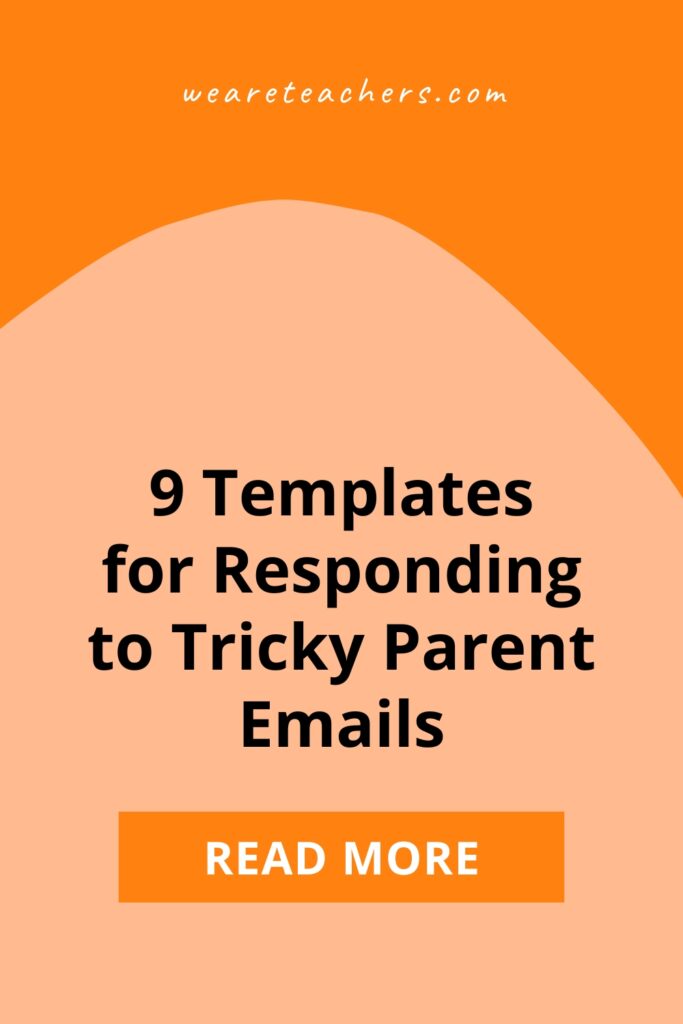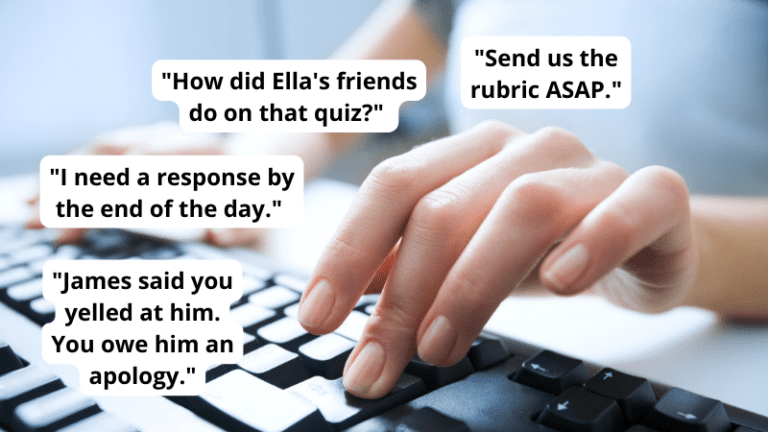One day, we’ll repair the education system. Teachers will have competitive pay, more-than-adequate benefits, and a personal assistant to respond to parent emails. I’ll be able to tell my grandchild, “You know, when I was a teacher, I had to spend a big part of my day emailing parents.”
Hopping off of his hoverboard, he’ll frown and call out, “Mom! Grandma’s talking nonsense again.”
Until then, we’ve created some email templates you can use to save time and the all-too-precious mental energy it takes to email parents beyond the quick “Thanks for letting me know!” or “Ezra said the funniest thing in class today!”
But before we get to the templates, here are some good rules of thumb for emailing parents:
- Be brief but polite. I always start by thanking them for reaching out and try to validate their concerns.
- Assume the best intentions. Acknowledge the possibility of miscommunication, misperception, and mistakes when possible instead of blame. The value of trustworthy relationships far outweighs the temporary satisfaction of being able to write, “Per my last email …”
- Have a default greeting and closing ready to go. If you always use “Dear ____” and “Thanks, ____,” that’s one less thing you have to think about. Even better if you set up an automatic email signature!
- Be careful with your response time. It’s tempting to want to fire off a reply right away. But this can actually increase the number of emails by creating a text/chat-type environment (“Oh! One more thing!” “Oh, I forgot to attach the form.”) Plus, if you email parents right away, they’ll expect instant communication from you every time. Waiting—especially on more contentious emails—gives everyone a chance to cool down before sending a response.
- Don’t agree or commit to anything you feel weird about over email. Take the time to talk it over with other teachers or a supervisor before responding. Sometimes parents will request special accommodations that should be part of a more formal IEP or 504 meeting.
- Don’t put anything in email you would feel sheepish about defending to your superintendent.
9 Templates for Responding to Tricky Parent Emails
1. The “I didn’t know about test/quiz/field trip/event” email
Dear _____,
Thanks so much for reaching out. I’m sorry to hear that you were caught off-guard with last week’s [TEST/QUIZ/EVENT]. I just checked to verify that it was listed in [NEWSLETTER/WEBSITE/SCHOOL INFORMATIONAL SYSTEM]. Let me know if you had access issues—I know that can happen sometimes.
I’m happy to allow [STUDENT] to make up the test per our grading policy. [OR: While our grading policy does not allow students to retake quizzes, here are some other ways he can show his learning and recoup those points …]
2. The “I want to know why my child got this grade” email
Dear _____,
Thanks so much for your email. I’m happy to share more feedback with you on [STUDENT]’s areas for improvement. Let me know whether [SPECIFIC START/END TIME] or [SPECIFIC START/END TIME] works better for me to call.
*Note: While it may seem like this approach adds more to your workload, it actually takes less time to hop on a phone call than it would to scan the relevant materials, transcribe or copy-paste all the feedback you gave the student, and copy and paste relevant sections of the rubric, etc.
3. The “I want to opt my child out of this lesson/book because I find it offensive” email
If your district does not allow opting out for this unit of study and does not provide the language for your response:
Dear _____,
Thank you for sharing this concern. [UNIT OF STUDY] is listed as a state learning standard: [COPY AND PASTE STANDARD]. [UNIT OF STUDY] meets these requirements for learning. If you have any questions, please contact our district lead for [CONTENT AREA], [NAME], at [EMAIL].
If your district allows opting out for this unit of study:
Dear _____,
Thanks so much for communicating this with me. Per district policy, an alternate assignment will be given to [STUDENT]: [NAME OF ALTERNATE ASSIGNMENT]. If you have any questions, please contact our district lead for [CONTENT AREA], [NAME], at [EMAIL].
Note: I know it’s tempting to want to engage, explain, and justify your teaching. But this just opens you up for more work that ultimately boils down to families’ values and beliefs about humanity, which are not our job to change. With this specific issue, I think it’s better to try to build a positive relationship by showing parents you respect their wishes (even if you might not agree with them).
4. The “Your class is too hard for my child” email
Dear ____,
I’m so glad you reached out. I’m so sorry that [STUDENT] has been feeling confused or lost in class.
Let’s start with tutorials on [DAY and TIME], where I can chat with [STUDENT] and figure out where the disconnect is happening. From there we can develop a plan to either continue tutorials, address any relevant classroom issues, or recommend resources to give them some extra practice.
5. The “Please give my child an extra day on the project because we had a commitment last night” email
If the answer is yes:
Dear _____,
Thanks for reaching out about this. I understand how hectic this time of year can get.
Can you ask [STUDENT] to [TALK WITH/EMAIL] me about this today? I know asking things of a teacher can feel intimidating, but I’d love to give them a low-risk opportunity to practice self-advocacy.
If the answer is no:
Dear _____,
Thanks for reaching out about this. I understand how hectic this time of year can get.
Per our grade-level policy, late [TESTS/PROJECTS] are [NUMBER] points off per day. However, I’m happy to work with [STUDENT] on other ways they can show their learning to recoup those points.
6. The “I don’t think my child is getting enough homework. Can you send more?” email
Dear ______,
Thanks so much for reaching out about this. It’s important to me that homework is meaningful, but also that each of my students is challenged appropriately.
Here are some online resources and links to good workbooks I’ve gathered for you to extend learning at home: …
Note: I think it’s important to set boundaries with families, including their ability to give you more work. Providing them links to workbooks and online resources connects with them opportunities to extend their child’s learning without giving you extra copying, grading, and feedback to do.
7. The “My child is getting too much homework/homework takes too long” email
Dear _____,
Thanks for reaching out about this. It’s so important to me that homework is meaningful, not stressful. I’m glad you let me know.
I’d love to chat with you about some ideas I have for reducing the overwhelm [STUDENT] is feeling. Let me know whether [SPECIFIC TIME] or [SPECIFIC TIME] works better for me to call.
8. The “My child told me about a negative interaction with you/classmate” email
Dear _____,
Thank you for letting me know about this. I’m so sorry to hear that [STUDENT] was feeling [UPSET/FRUSTRATED] about what happened yesterday.
I’d like to make sure we’re on the same page as soon as possible. Let me know whether [SPECIFIC TIME] or [SPECIFIC TIME] works better for me to call.
Note: Like the “I want to know why my child got this grade” email, this approach actually saves you work (and the risk of tone being misinterpreted). But more important, this approach also protects student privacy if the parent wants to discuss an incident involving a classmate.
9. The “We’re going on vacation, can we get the work/test early?” email
Dear _____,
How exciting! That will be such a great learning experience for [STUDENT].
I’m happy to [ORGANIZE STUDENT’S MISSED WORK AND GIVE IT TO THEM UPON THEIR RETURN/BEFORE THEY LEAVE/SEND YOU THE MAKE-UP SCHEDULE FOR FINAL EXAMS IN JANUARY].
Wishing you safe travels and a wonderful vacation!
Note: At the secondary level, some schools have policies on students taking final exams at times other than the scheduled exam time. Some even have forms for parents to fill out to request vacations. Be sure to verify with your school that you’re following protocol. If you’re at a new school, I would also run your reply by teachers who have been there a while to make sure you’re in-step with others’ responses.
Every situation, child, and school is different, so you’ll have to adjust your responses accordingly. But with these email templates, you have a framework of how to respond professionally, kindly, and in a way that protects everyone involved.
For more tips on parent management, check out this great roundup.
For more tips, tricks, and ideas like this, be sure to subscribe to our newsletters!


